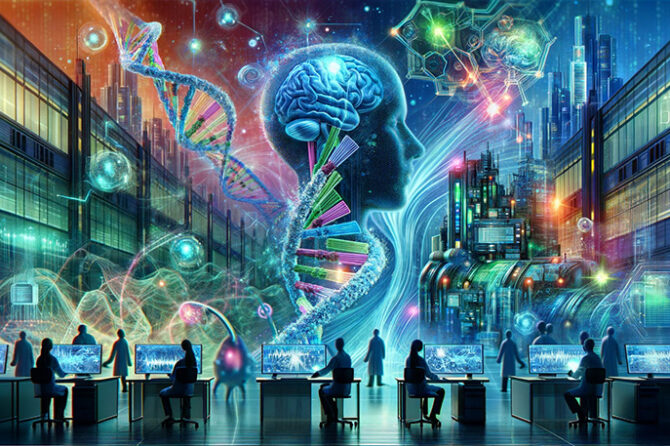
The intersection of biotechnology and artificial intelligence (AI) represents one of the most promising frontiers of innovation, with industry leaders like Nvidia, Google, and Microsoft betting billions on its potential. This convergence is poised to revolutionize how we approach healthcare, drug discovery, and the broader field of digital biology. As AI technologies, exemplified by language models like ChatGPT and Gemini, continue to mature, these tech giants are shifting their focus towards leveraging AI to tackle some of the most complex challenges in biotech.
The Promise of AI in Biotech
The application of AI in biotechnology, particularly in drug discovery and digital biology, holds immense potential. Traditional drug discovery processes are notoriously time-consuming and expensive, often taking over a decade and costing upwards of $2.6 billion to bring a single new drug to market (DiMasi, Grabowski, & Hansen, 2016). AI promises to significantly streamline this process by analysing vast datasets to predict how different compounds will interact with biological targets, thereby identifying promising drug candidates much more rapidly and at a fraction of the cost.
Moreover, digital biology — the practice of applying computational techniques to understand the complexities of biological systems — is another area where AI is set to make a substantial impact. By simulating and analysing biological processes, AI can help researchers understand diseases at a molecular level, opening up new avenues for treatment and prevention.
Why Nvidia, Google, and Microsoft Are Investing Heavily
Nvidia, traditionally known for its graphics processing units (GPUs), has identified healthcare and biotech as key areas for growth. At the JPMorgan Healthcare Conference, CEO Jensen Huang emphasized Nvidia’s commitment to these sectors. Nvidia’s GPUs are ideally suited for the parallel processing tasks required for deep learning, a subset of AI, making them invaluable tools for researchers working in bioinformatics and computational biology. Furthermore, Nvidia has developed specialized platforms like Clara Discovery, which are tailored specifically for computational drug discovery, illustrating the company’s strategic investment in biotech’s AI-driven future.
Google, through its AI subsidiary DeepMind, has already demonstrated the potential of AI in biotech with AlphaFold, an AI system that can predict the 3D structures of proteins with remarkable accuracy. This capability is critical for understanding diseases and developing new treatments, and AlphaFold’s success has been heralded as a major breakthrough in the field (Callaway, 2020). Google’s Cloud services also offer powerful computational resources and AI tools for biotech companies, facilitating research and development efforts.
Microsoft has made significant strides with its AI for Health initiative, focusing on leveraging AI to improve healthcare outcomes. Microsoft’s investments in biotech AI include partnerships with companies and organizations working on everything from genomics to clinical trial optimization. The company’s cloud computing and AI capabilities make it a key player in providing the computational power necessary to process and analyse the vast amounts of data generated in biotech research.
Challenges and Opportunities Ahead
Despite the potential, integrating AI into biotech is not without its challenges. Data privacy and ethical considerations are paramount, as AI systems require access to sensitive and potentially identifiable health information. Ensuring the security and privacy of this data while enabling the necessary data sharing and analysis is a delicate balance that must be achieved.
Additionally, while AI can accelerate certain aspects of drug discovery and digital biology, the technology is not a panacea. AI models are only as good as the data they are trained on, and biases in data can lead to skewed or inaccurate predictions. Ensuring data quality and diversity is crucial for the success of AI applications in biotech.
Inference
As we stand on the cusp of a new era in biotechnology, the investments by Nvidia, Google, and Microsoft underscore the transformative potential of AI in this field. By accelerating drug discovery processes, enabling new insights into biological systems, and creating more personalized and effective healthcare solutions, AI holds the promise to dramatically improve human health and well-being. However, realizing this potential will require not only technological innovation but also careful attention to the ethical, privacy, and data quality challenges that accompany the use of AI in biotech. As these tech giants continue to push the boundaries of what’s possible, their investments in biotech’s AI future could herald a new age of medical breakthroughs and innovations.
Prof. Dr. Prahlada N. B
24 March 2024
Chitradurga.

















Certainly Prahlada Sir 💐,
AI (artificial intelligence) has a wide range of applications in biotechnology, revolutionizing the industry in various ways. Some key areas where AI is being used in biotechnology include:
* AI has the potential to accelerate the 'drug discovery' process and reduce the time and cost associated with bringing new drugs to market.
* AI is being used to analyze genetic and molecular data to develop 'personalized treatment plans' for patients based on their individual characteristics. This has the potential to improve treatment outcomes and reduce adverse reactions to medications.
* AI algorithms can process and interpret 'large-scale genomic data', enabling faster and more accurate analysis of genetic variations, gene expression patterns & disease associations.
* AI tools are used for 'bio- informatics', ie to analyze biological data, such as DNA sequences, protein structures, and metabolic pathways, to gain insights into complex biological systems
* AI is used to optimize 'bioprocessing techniques & manufacturing processes', leading to improved efficiency, yield, and quality of biotechnological products such as pharmaceuticals, enzymes, and biofuels.
* AI-based algorithms are used to interpret 'medical imaging data', identify patterns indicative of diseases, & also assist in diagnosing conditions such as cancer & neurolgical disorders.
Overall, AI has the potential to transform the biotechnology industry by enabling more efficient and precise research, development, and commercialization of biotech products and therapies.
Reply